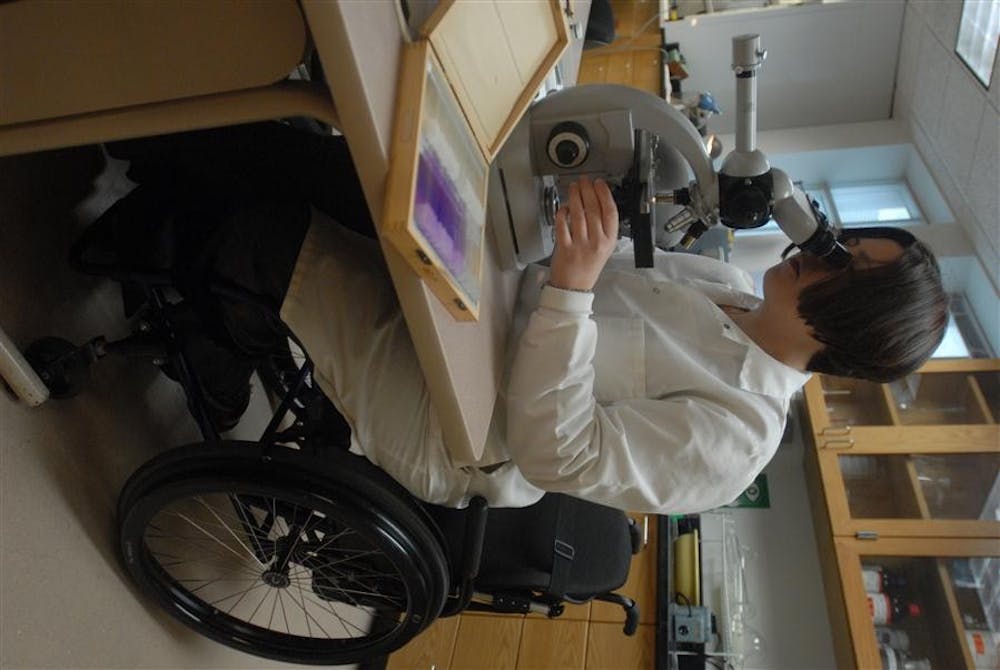Jenelle Dorner has spent years fighting fatigue, malnutrition and pain.
Dorner, a doctoral candidate in neuroscience and psychology at IU, was diagnosed with mitochondrial disease, dystonia and gastroparesis, which combined have left her wheelchair-bound with a surgically inserted tube that helps send nutrition directly to her heart.
Mitochondrial disease is degenerative genetic mutation, which, Dorner said, means she has half the energy as someone without the disease. She also suffers from dystonia symptoms — muscle spasms, pain and weakness, and gastroparesis symptoms, or the inability of her body to process food normally.
Even after her first diagnosis in 1996 with dystonia — the third most common movement disorder in the U.S. — which came with many hospital visits and surgeries, Dorner said she has not let that end her work in neuroscience.
“It’s possible to live in spite of chronic illness and deal with what I have to deal with every day,” she said. “I think a lot of people just give up when this happens. They just say ‘throw in the towel, I’m disabled now’ and give up, but it doesn’t have to be that way.”
Dorner, who began her education at the University of Illinois in 1994, has researched various diseases and is currently writing her dissertation on the role of estrogen in the development on Huntington’s disease.
Mother of a 5-year-old son, Leif, Dorner said she finally plans to finish her research and achieve her degree this spring.
Along with self-motivation, assistance has come in other forms to help Dorner achieve her degree.
Since 2005, Dorner has been awarded four fellowships during her academic career, including the National Science Foundation’s Graduate Research Fellowship, without which she said would not have been able to continue her studies.
Along with financial support, Dorner said she strongly values disability services for students in higher education.
When she was first battling her dystonia, Dorner said was not able to take notes during her classes at Illinois, which severely impacted her learning process.
“I had a lot of problems writing and taking notes, so I had to have a scribe for some of my classes. I usually had a friend or someone through disabled student services that was able to write for me,” she said.
The disability services for students at Illinois, she said, were an instrumental part of her education because they helped her through many of her classes.
Similar assistance is available to students at IU through the Office of Disability Services for Students.
“If there were a class that a student was enrolled and they have to be places that they cannot get to, and there are places on this campus that are inaccessible, what we would have to do is have that class relocated to an accessible location,” Martha Engstrom, director of Disability Services said.
Engstrom also said there are a multitude of possible accommodations for students that require specific assistance, including extra time for tests or technology-based assistance offered through IU’s Adaptive Technology and Accessibility Centers on campus.
“It all comes down to what the student needs,” she said. “Tell me about how you are affected by you disability. What in particular would benefit you?”
Dorner said she has filed complaints about wheelchair accessibility on campus, including the need for more automatically opening doors and better accessibility to handicapped parking meters.
The office, she said, has been responsive and helpful following each complaint.
Because Dorner has spent years battling her ailments, she said she has also spent time advocating for others.
In the past, Dorner said she worked as a junior board member for the Dystonia Medical Research Foundation in order to educate the public and raise funds.
She said she often carries pamphlets about the disease with her to hand out in public.
“It’s sad because there are so many people who are profoundly affected by dystonia and yet if you say dystonia, people don’t necessarily know what that is or means,” Dorner said.
Dorner, through her perseverance and successes, has managed to encourage many of those around her, including fellow graduate student and close friend Shely Ferguson.
“It’s tough to see her pump all these meds all the time and be tired and struggle, but she deals with it really well — better than I would be able to,” Ferguson said. “She is really inspiring.”
Through it all, Dorner — a practicing Buddhist — said she maintains a simple philosophy — live every day in the moment.
“Don’t worry so much about those day to day little things,” Dorner said. “Just take one day at a time and do the best you can with what you have, and eventually you will reach your goals.”






